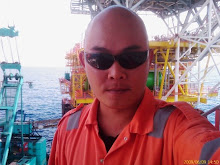 To start with, the best way to be run-off from the barge (Official term offshore for getting fired or transferred to another barge) is to break the safety rules on-board. Getting tired of working offshore? Wish to go home earlier then your scheduled time off? - Well, then try smoking next to the safety sign thats says "NO SMOKING". I am pretty sure you will get the 'first class ticket' home. In fact the company would even fire you JUST BEFORE your hit the ground because you were stupid enough to work on un-safe conditions at high places. Pretty straight forward. And like my boss would say, "...this I promise ya"
To start with, the best way to be run-off from the barge (Official term offshore for getting fired or transferred to another barge) is to break the safety rules on-board. Getting tired of working offshore? Wish to go home earlier then your scheduled time off? - Well, then try smoking next to the safety sign thats says "NO SMOKING". I am pretty sure you will get the 'first class ticket' home. In fact the company would even fire you JUST BEFORE your hit the ground because you were stupid enough to work on un-safe conditions at high places. Pretty straight forward. And like my boss would say, "...this I promise ya"No doubt about it, the offshore or rather oil & gas industry spends a mother-load of money each year on safety at work and I can't blame them for giving me a scare when I first got here offshore. Hell, they even manage to scare the shit out of me when I was in the Basic Sea Survival course in MSTS (Miri). The videos and pictures of past disasters & accidents were good enough to put me on my toes, no need a second reminder. And glad I am that they did, hell, I know I am out here for the money, but I really don't want to go home in a body back or with one finger less. We keep it safe here, not just for ourselves but for each other. Its a buddy system we call it, you take care of yourself & me, and I will take care of myself and you.
Anyways, for those would be offshore workers. It is always a good thing to go through the Basic Sea Survival courses and attached the certificate with your resume when applying. This will be a bonus on to your application. Why? Well, basicly it shows that you have the fitness physically and mentally to work offshore and also it will save the employing company a lot of time and money to send your sorry arse to one. It does cost from RM2800 to RM3500 after all and on top of that the fee for a full medical check-up at authorised clinics. You should however, make sure it is OPITO approved and a full T-BOSIET plus boat transfer and underwater helicopter escape training. Did I say UNDERWATER helicopter escape? Yep..I did.
There is also a friend of mine who is planning to work offshore but he is aquaphorbic (scared of being under water) and thats not because he's cannot swim. It's because he's afraid of being underwater that made him cannot swim. Well, let me re-assure you and all you land lover dumb ducks out there, no matter how hopeless you are in staying a float while in water, ONLY, I say again, ONLY if your weight is 300 kilograms and above then you will probably sink to the bottom while wearing a work vest (see photo below). Most people will just stay a float without even trying to stay a float while wearing one.
A Safety Helmet or most commonly called a 'hard hat', is another basic requirement to be worn while walking around the deck. It does protect the head from falling objects like bolts & nuts, small pieces of wood or anything to a certain degree. It won't however, protect us from a 200 ton load falling overhead. Usually when we see those kind of load hanging, we move away from underneath it. Pure logic and simple safety rule.




hello..coming by here..i hv a fren working offshore too..
ReplyDeleteYou've answered a question I had about safety vests. Haha! Cannot read your blog while at work lah. Pening kepala. Too many words :D
ReplyDeleteRead it at night la, at home :)
ReplyDelete